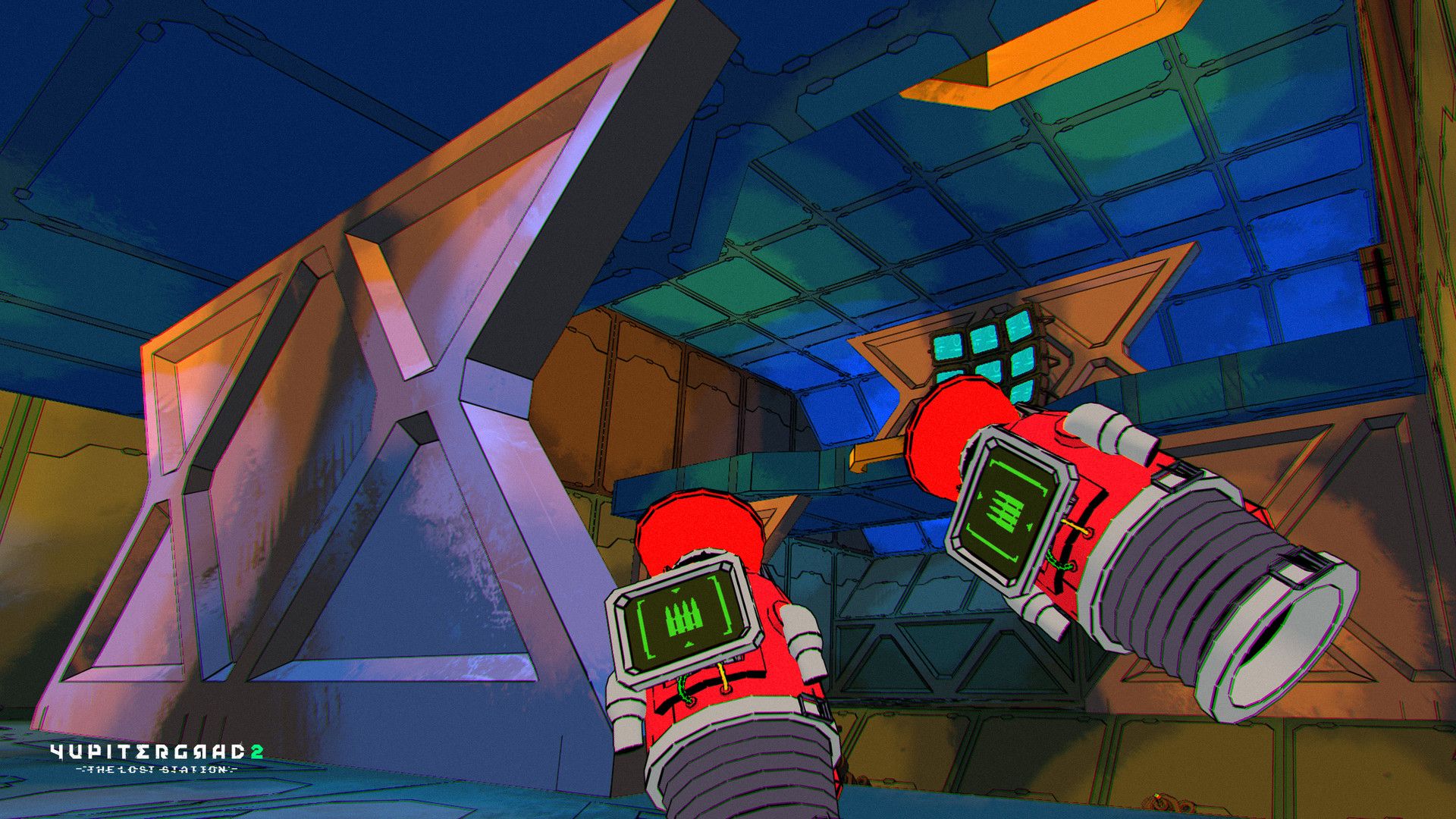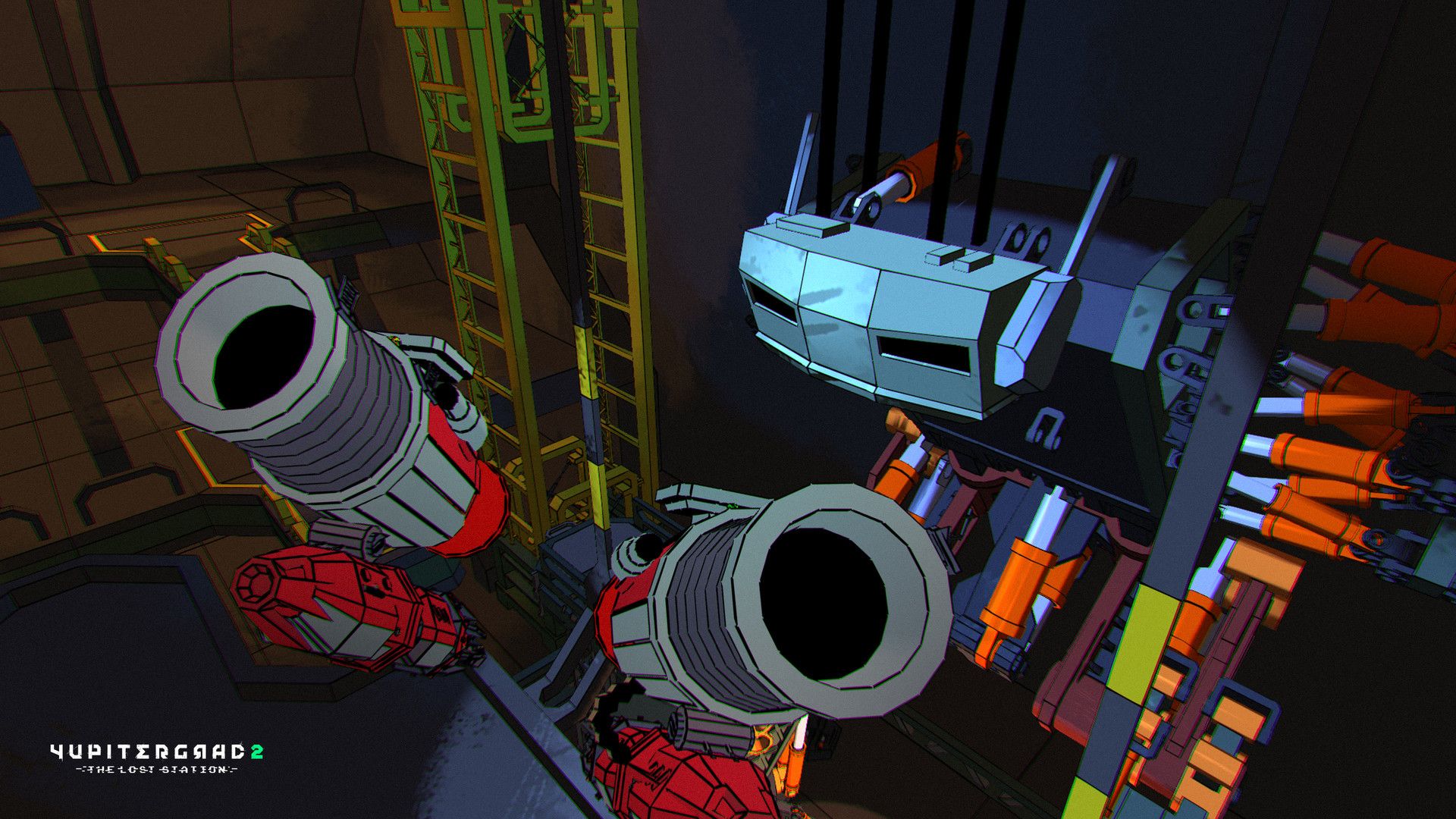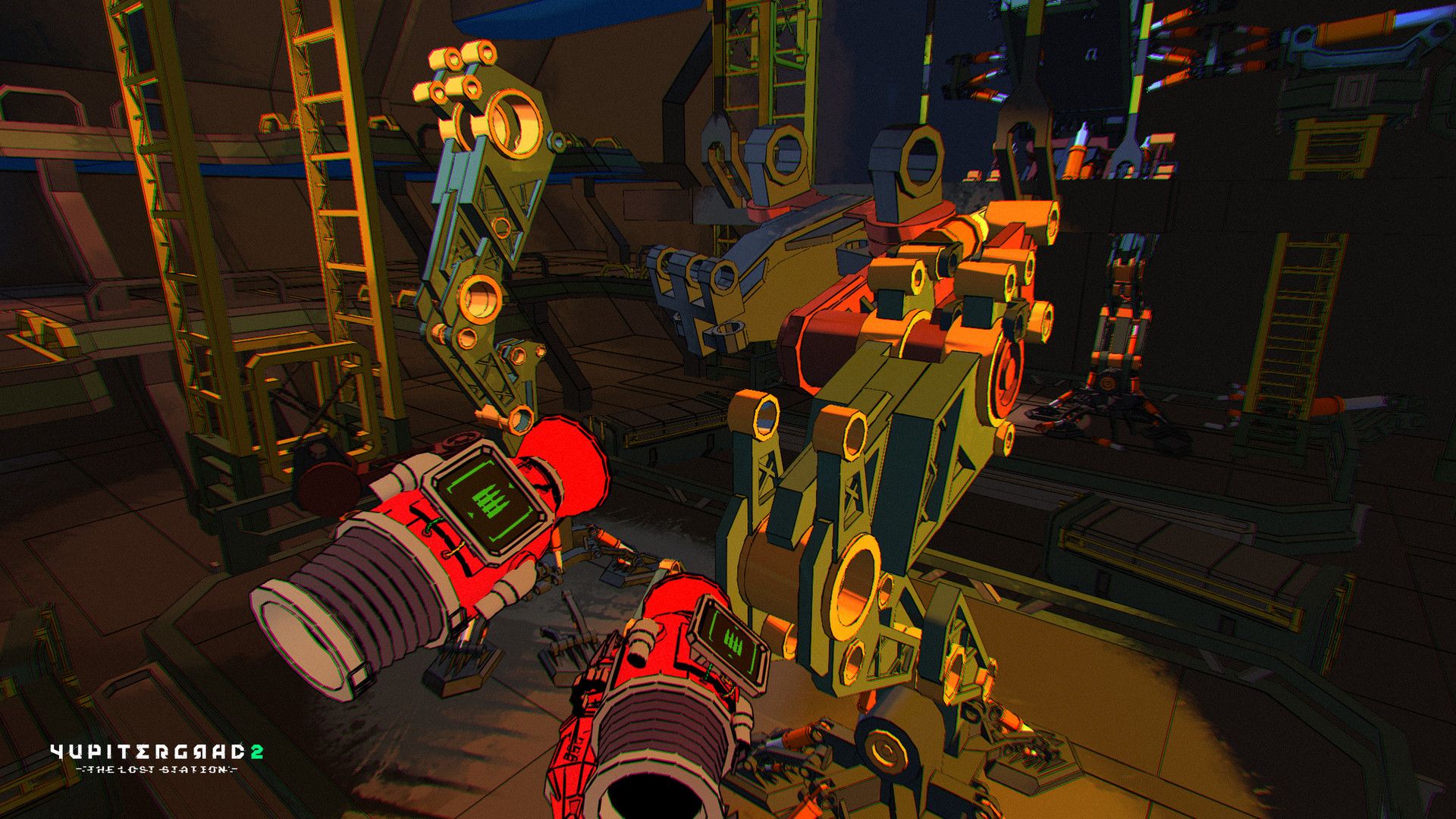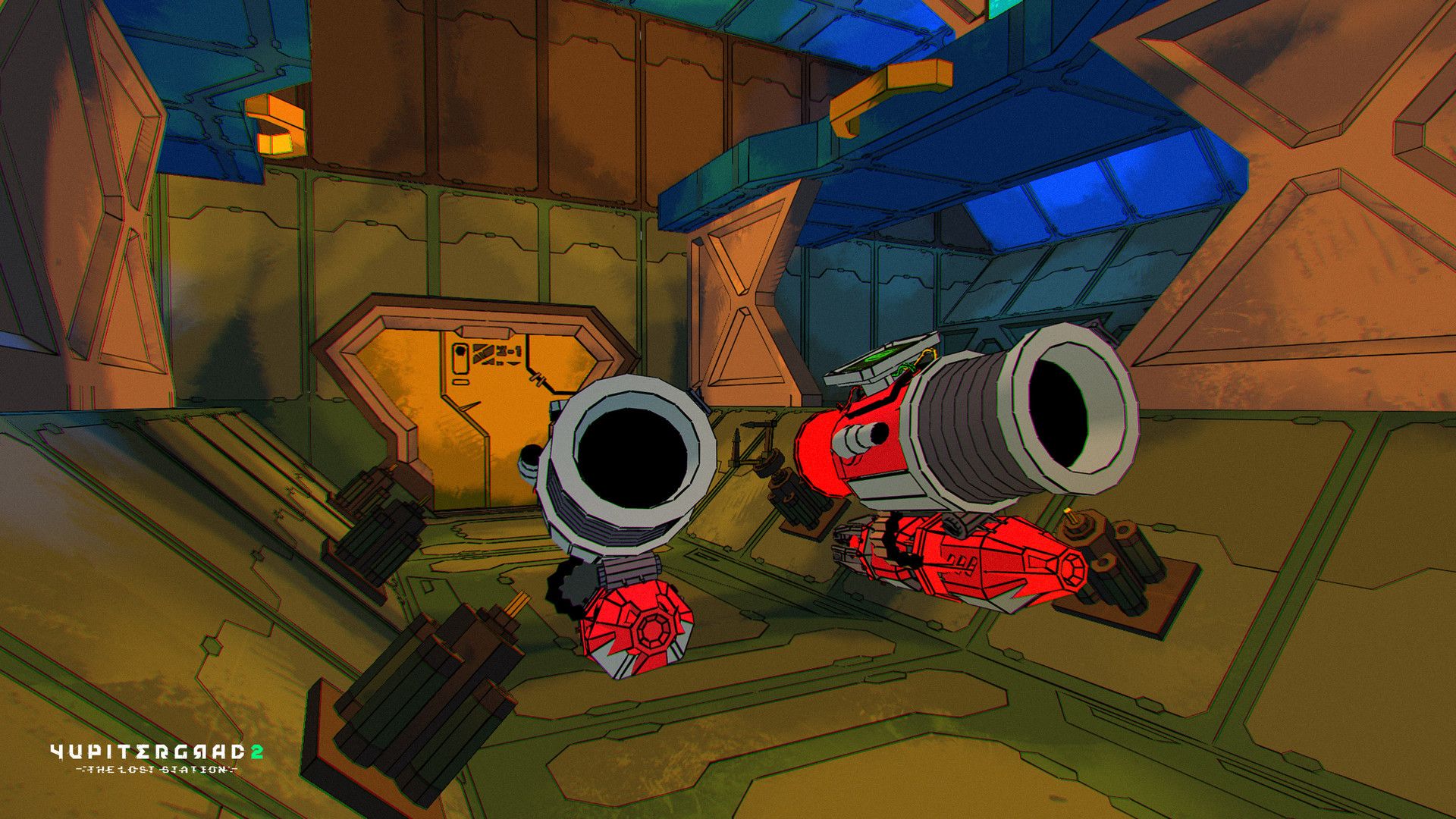Available now for Pico headsets and coming later this month to Quest, Vive XR Elite and PC VR, Gamedust retraces familiar territory in The Lost Station. Read on for our full Yupitergrad 2 review.
It’s cold in space. Thankfully, I have my rage to keep me warm, so I think I’ll be ok.
Fifteen minutes ago, I set off across the space station heading for the simple puzzle I’ve just completed. I can tell from the tone of the dialogue that I’m narrowing in on the endgame. I can feel it. I can also tell that this game is not going to give up easily.
What is it?: A sequel to 2020 platformer-puzzler Yupitergrad
Platforms: Pico 4, Quest, PC VR, Vive XR Elite (Review conducted on Pico 4)
Release Date: Out now on Pico 4, coming soon to other platforms.
Developer: Gamedust
Price: $24.99
My mission – possibly the penultimate one – has just been handed down. It’s simple: ‘Make your way to Life Support.’ I open the map and trace the endless warren of corridors and passageways through the expanse of the decrepit space station until I find my target. I swear softly under my breath. That’s a long way away… and exactly I’ve just come from there.
This kind of backtracking is a common occurrence in Yupitergrad 2: The Lost Station. Available exclusively on Pico headsets right now and coming to Quest, PC VR and Vive headset later this month, it’s a sequel that retraces familiar paths in more ways than one.
Here We Go Again
The Lost Station begins directly after the events of the first Yupitergrad, with a short sequence that links the two deep space stories together before players swing straight into the action. Similarities between the two games become quickly apparent and fans of the first game may initially find themselves struck with a moderate case of déjà vu.

Trapped in an abandoned space station, players will traverse through eerie corridors filled with devious obstructions. Accompanied by a caustically wise cracking AI sidekick, you will begin roaming the station at the behest of the mysterious on-board computer system.
The narrative provided by these characters exists purely to set up a series of simple missions. While these occasionally involve puzzles or combat encounters, they mainly serve to drive players through the labyrinthine passages of the enormous space station. After around six hours of light hearted puzzle-swinging, the story culminates in a predictable confrontation, complete with playfully acerbic dialogue and an anticlimactic boss fight.
Spider-Mario
As with the first game, your method of traversal is the most obvious choice of deep space ambulation: plunger swinging.
Armed with a pair of retractable plunger gauntlets, players will swing through winding passages like a low gravity Spider-Plumber and use gestures to affect speed and direction. Yupitergrad’s swinging physics are well-implemented, with a deliberately ‘floaty’ feel that suits the context of the gameplay.

The plungers can be upgraded and equipped with a small array of weaponry as well as booster jets, which give greater control while swinging and become the main traversal method in certain zero gravity sections.
It’s a responsive and intuitive movement system that works well for navigating around the platforming hazards, which include moving lasers, giant rotating fans, monumental jumps and more. Overcoming a treacherous mix of traps by blending precise timing with pinpoint accuracy to evade death is, at first, quite rewarding. However, for the most part the challenges are easily mastered. With a limited range of hazards to contend with, the gameplay soon becomes repetitive.
That repetitiveness is only compounded by the unusual amount of backtracking involved when moving between objectives. The way missions are set out will mean that players are frequently retracing painfully-circuitous routes in order to move forward. The scale of the station makes this maddening and the unavoidable rehashing becomes an insurmountable frustration long before the game is over.
Plunge Me Tender
One big new addition to Yupitergrad 2 is combat, which gets mixed into the platforming sequences. Each gauntlet can be upgraded with either a railgun or a minigun and occasionally sections of corridor will give way to large antechambers filled with enemy drones that must be dispatched before you can progress.

Although an admirable addition, the combat isn’t particularly nuanced – Yupitergrad 2 is definitely not an action game. With only two guns and limited enemy types, it doesn’t compare with other grapple-based action titles like Swarm or Dead Hook. However, when viewed as another obstacle in the game’s roster of spatial challenges, the combat is still a net gain for the sequel.
Unfortunately, Yupitergrad 2 also loses one of the most satisfying elements of the original: Time Trials. In addition to the campaign, the original Yupitergrad also offered a series of short courses on which players could compete for fastest-time bragging rights. It was a brilliant mode that delivered enormous replay value, propelling the title well beyond the “one-and-done” nature of its campaign. Without Time Trials, reasons to return to Yupitergrad 2 after the campaign are sadly non-existent.
Sound of Silence
In terms of visuals, this sequel keeps a consistent art direction with its predecessor and uses the same popular cell-shaded art style with bold, chunky lines and a muted-but-versatile color palette that suits the setting. A clear visual language is employed to ensure the game world can be understood at a glance, with object colors clearly denoting specific functionality.

Despite the clear art direction, Yupitergrad suffers at the hands of its own subject matter. Endless passageways floating in the inky void of space do not make for a varied landscape and environments become very similar within short order.
The game uses an atmospheric soundscape, treading a balance between empty and unobtrusive with relative finesse. The music is appropriately subdued, providing ambient industrial electronica with just enough Soviet-era bravado to fit the context without becoming kitsch. The sound design is entirely functional, informing the player of their surroundings and matching the tone well.
Performance Swings
On Pico 4, Yupitergrad 2 also suffers from noticeable frame drops, most common in combat sections when environments are larger and the scene is occupied by numerous moving objects. While not consistent through the entire game, they’re a serious distraction when they do occur and also severe enough to become nauseating.
Yupitergrad 2 Review – Comfort
On the topic of nausea, it’s worth pointing out that Yupitergrad 2 is played exclusively with artificial locomotion. As such, some players will require a level of resilience to nausea and motion sickness.
Considering the intense movement system, there’s a surprisingly slim array of comfort options – switching between snap and smooth turning is the only toggle on offer, with no option for vignetting. Players susceptible to VR motion sickness should approach with caution.
Yupitergrad 2 Review – Final Verdict
Yupitergrad 2 offers a simple platforming adventure that falls short of delivering a compelling experience. There’s a range of positive elements – the movement mechanics, the mix of puzzles and platforming, and even the addition of basic combat – but they’re all let down by design decisions that elongate the campaign before making it fun.
With limited variety spread across a truly vast and repetitive setting, Yupitergrad 2 ends up feeling a bit homogenous and hard to recommend. Those looking for a platforming adventure might just be better off picking up the original instead.
UploadVR focuses on a label system for reviews, rather than a numeric score. Our reviews fall into one of four categories: Essential, Recommended, Avoid and reviews that we leave unlabeled. You can read more about our review guidelines here.
- SEO Powered Content & PR Distribution. Get Amplified Today.
- PlatoData.Network Vertical Generative Ai. Empower Yourself. Access Here.
- PlatoAiStream. Web3 Intelligence. Knowledge Amplified. Access Here.
- PlatoESG. Automotive / EVs, Carbon, CleanTech, Energy, Environment, Solar, Waste Management. Access Here.
- BlockOffsets. Modernizing Environmental Offset Ownership. Access Here.
- Source: https://www.uploadvr.com/yupitergrad-2-review/
- :has
- :is
- :not
- $UP
- 11
- 12
- 200
- 2020
- 24
- 25
- 36
- 7
- 75
- 8
- a
- About
- accompanied
- accuracy
- across
- Action
- addition
- admirable
- Adventure
- affect
- After
- ago
- AI
- All
- also
- Ambient
- amount
- an
- and
- Another
- apparent
- approach
- appropriately
- ARE
- around
- Array
- Art
- artificial
- AS
- At
- atmospheric
- available
- avoid
- Balance
- basic
- BE
- become
- becomes
- becoming
- been
- before
- begin
- Better
- between
- Beyond
- Big
- Bit
- blending
- bold
- booster
- BOSS
- Breath
- brilliant
- but
- by
- Campaign
- CAN
- case
- categories
- caution
- certain
- challenges
- characters
- choice
- chunky
- clear
- clearly
- Close
- cold
- color
- COM
- combat
- come
- comfort
- coming
- Coming Soon
- Common
- compare
- compelling
- compete
- complete
- Completed
- computer
- conducted
- consistent
- content
- context
- control
- could
- courses
- Date
- dead
- Death
- decisions
- deep
- definitely
- delivered
- delivering
- Design
- dialogue
- direction
- directly
- do
- Doesn’t
- down
- drive
- Drones
- Drops
- each
- easily
- either
- elements
- elite
- embedded
- employed
- Endless
- ends
- enormous
- enough
- ensure
- Entire
- entirely
- environments
- equipped
- essential
- Even
- events
- exactly
- exclusively
- exists
- experience
- Fall
- Falls
- familiar
- fans
- feel
- fight
- filled
- final
- Find
- Finesse
- First
- fit
- floating
- focuses
- For
- Forward
- four
- FRAME
- frequently
- from
- frustration
- full
- fun
- functional
- functionality
- Gain
- game
- gameplay
- Games
- Gauntlet
- giant
- Give
- Glance
- Go
- going
- gravity
- greater
- guidelines
- GUNS
- Hands
- Hard
- Have
- Heading
- Headset
- headsets
- Hit
- HOURS
- However
- HTTPS
- i
- I’LL
- in
- include
- industrial
- initially
- instead
- into
- intuitive
- involve
- involved
- IT
- ITS
- Jets
- jpg
- jumps
- just
- Keep
- Kind
- Label
- landscape
- language
- large
- larger
- lasers
- later
- Leave
- let
- Level
- Life
- light
- like
- Limited
- lines
- links
- Long
- looking
- Loses
- lost
- Low
- Main
- mainly
- make
- MAKES
- Making
- map
- mark
- matching
- Matter
- May..
- me
- mean
- mechanics
- method
- might
- Minutes
- Mission
- missions
- mix
- mixed
- Mode
- Month
- monumental
- more
- most
- motion
- move
- move forward
- movement
- moving
- Music
- must
- my
- mysterious
- NARRATIVE
- Nature
- navigating
- net
- New
- no
- now
- numerous
- object
- objectives
- objects
- obstacle
- obvious
- of
- off
- offer
- offered
- Offers
- official
- on
- ONE
- only
- open
- Option
- Options
- or
- order
- original
- Other
- our
- out
- over
- overcoming
- own
- pair
- palette
- part
- particularly
- PC
- pc vr
- Physics
- Pico
- pico 4
- Platforms
- plato
- Plato Data Intelligence
- PlatoData
- played
- player
- players
- Popular
- positive
- possibly
- precise
- predecessor
- Predictable
- Progress
- propelling
- provided
- providing
- purely
- puzzle
- Puzzles
- quest
- quickly
- Rage
- range
- rather
- Read
- reasons
- recommend
- recommended
- regular
- rehashing
- relative
- repetitive
- require
- resilience
- responsive
- return
- review
- Reviews
- rewarding
- right
- rights
- roster
- routes
- s
- same
- Scale
- scene
- score
- sections
- Sequence
- Series
- serious
- serve
- set
- setting
- severe
- Short
- should
- Sidekick
- similar
- similarities
- Simple
- SIX
- small
- smooth
- Snap
- So
- some
- soon
- Sound
- Space
- space station
- Spatial
- specific
- speed
- spread
- station
- Still
- Stories
- Story
- straight
- Struggles
- style
- subject
- such
- Suffers
- support
- susceptible
- Swing
- system
- Target
- tell
- terms
- territory
- than
- Thankfully
- that
- The
- their
- themselves
- There.
- These
- they
- think
- this
- those
- Through
- time
- timing
- Title
- titles
- to
- together
- TONE
- topic
- Trace
- trailer
- traps
- trials
- truly
- Turning
- two
- types
- under
- understood
- until
- upgraded
- UploadVR
- use
- uses
- value
- variety
- Vast
- very
- visuals
- vive
- vive xr elite
- vr
- warm
- warren
- was
- Way..
- ways
- we
- WELL
- when
- which
- while
- will
- WISE
- with
- within
- without
- works
- world
- worth
- XR
- You
- Your
- youtube
- zephyrnet
- zero













